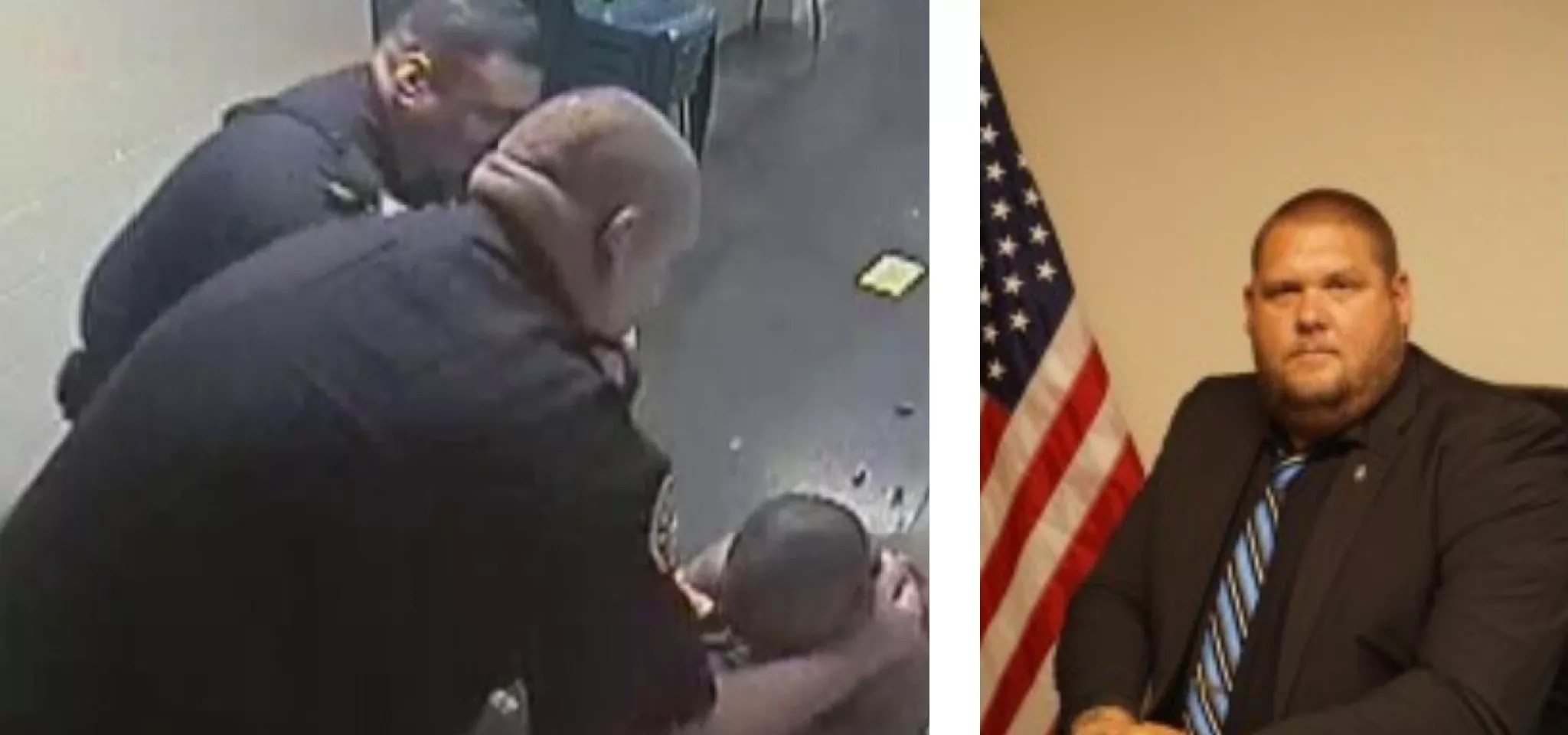
Denver Sheriff Department via Denver7/LinkedIn

Audio By Carbonatix
Denver Sheriff Department Deputy Bret Garegnani was among the law enforcement officials implicated in the 2015 jail death of inmate Michael Marshall, but he wasn’t fired for his actions. Now, however, he’s been given his walking papers because of something else: slamming a handcuffed inmate against the floor this past March in an episode caught on video.
Garegnani’s case is at least the third recent instance in which a metro area officer who was allowed to keep his job after allegedly contributing to a Black man’s death was later sacked over a completely different matter. The incidents involve three of the most tragic in-custody deaths involving Black victims – not just Marshall, but also another inmate, Marvin Booker, who died in 2010, and Elijah McClain, who lost his life after a torturous encounter with Aurora police officers in 2019. The first two resulted in multimillion-dollar settlements – $6 million for Booker’s passing, $4.65 million in Marshall’s case – and while this week’s announcement of a deal related to a lawsuit filed by McClain’s parents doesn’t specify a dollar amount, it’s expected to be in the nine-figure range.
Attorney Mari Newman of Denver-based Killmer, Lane & Newman LLP, which has represented members of the Marshall, Booker and McClain families, is intimately familiar with this trend and appalled by it. “We need to be constantly vigilant to make sure that officers who violate people’s constitutional rights are swiftly removed from their departments,” she says, “and are not eligible to be hired in any other law enforcement capacity.”
The LinkedIn page for Garegnani, which lists his employment with the Denver Sheriff Department as stretching from October 2008 to October 2021, describes him as a “decorated Sheriff’s Deputy responsible for safety and security for multiple facilities that held over 3,000 inmates daily” and boasts that he “developed and implemented multiple trainings for other deputies, including firearms training, defensive tactics training, along with report writing classes,” “instructed new deputies as the lead field training and assistant firearms trainer,” and “handled high-risk extraditions and escorts of high-profile prisoners.” Also included are photos of his Top Gun award from 2008 and an undated Life Saving Award – but the text doesn’t mention that he was also nominated for that honor in connection with the Marshall case, for performing CPR on the inmate after pinning him down in a way that likely contributed to his death.
The individuals involved in the Marshall incident weren’t criminally charged, but three were disciplined, including Garegnani, who earned a sixteen-day suspension. Garegnani remained on the DSD staff, though, and was working in a courthouse on March 8 when he brutalized an inmate referred to in a disciplinary letter as “CB.” The inmate was 5′ 8″ and 130 pounds, while Garegnani is 6′ 6″ and 350 pounds. As a result, the letter states, “Deputy Garegnani knew or should have known that taking CB to the ground face first, when CB’s hands were cuffed behind his back, eliminated the possibility of CB being able to break his fall or mitigate damage, thus exposing him to significant damage.”
Here’s the video, as shared by the Denver Post.
To Newman, these images “beg the question: Why wasn’t this deputy fired when he brutalized and killed Michael Marshall? Because he absolutely should have been,” she says. “If he had been fired when he killed Michael Marshall, he wouldn’t have been in a position where he could continue putting inmates at risk – in particular, the inmate whose abuse at his hands led to his ultimate termination.”
Not that Newman was shocked when she heard about Garegnani’s actions. She points out that Deputy James Grimes, among the five officers targeted by critics over Booker’s death, was fired in July 2020 after “he decided it was a good idea to engage in drag racing in a prison van, going over 100 miles per hour with inmates in the back.” And then there was Aurora Police Officer Jason Rosenblatt, who was initially cleared of wrongdoing in the McClain case. The reason he was fired by the Aurora Police Department? He texted “Haha” in regard to a re-enactment photo of the McClain incident. Last month, though, Rosenblatt was one of five individuals indicted by a grand jury in connection with McClain’s death.
Some officers who escaped firing after these deaths appear to have stayed on the straight and narrow since then. Thanarat Phuvapaisalkij, a subject of the Marshall investigation, is currently a member in good standing of the Denver Police Department; the headlines he made in 2019 weren’t related to dubious behavior, but because a video of him breakdancing on the street with a seven-year-old went viral. Still, Newman considers this an exception to the rule. That’s why she’s pleased that a section of Senate Bill 217, the 2020 law enforcement reform bill to which she contributed, “contains a provision intended to make sure problem officers don’t continue to work and aren’t allowed to move from department to department to department.”
As for officers like Garegnani, she argues, “These are people who clearly should have been fired when they killed unarmed Black men in jail – but they weren’t, and they continued to go on and put other lives at risk. And these are just the people we know about.”
Click to read the Bret Garegnani discipline letter.